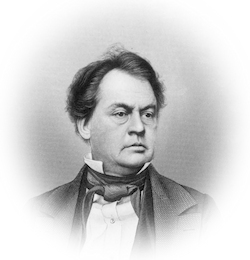Washington, D. C, 12th May, 1860.
Dear Stephens, I recd, your letter of the 8th inst. yesterday. It seems from yours that you had not recd, a letter I wrote you some week ago or more inclosing new brief in the Persons and Oliver case and giving you my action and views on the present state of things. When I saw that Douglas’s friends voted to make a platform before electing a candidate, thus playing into the hands of Alabama, I knew his friends look[ed] for and desired secession from the convention; and when their platform appeared refusing even an endorsement of the Dred Scott case, I telegraphed Irwin to show to our delegation to keep the South a unit, get a sound platform and a sound Southern man on it and if they found that was impossible, to bolt. A full view of the facts since the adjournment has satisfied me that my advice was good and I approve the action of the majority of delegates. I fought the campaign of 1848 against the doctrine of territorial intervention against slavery. I am not aware that I ever have by act or deed or thought altered my position on that question. I certainly never intended to do so, and recent events do not at all incline me to modify my hostility. I looked upon it with such contempt that I never made it [a] test, but I certainly would never submit to such a test. Douglas’s Harper article has indoctrinated all of his friends with his folly; and his success without a party disclaimer of his doctrines would compromit us forever. Therefore I have determined to have that party disclaimer, if I can get it, at all hazards. Mr. Douglas and his friends seem to act on the idea that our fear of Black Republican rule will make us submit to anything. As to me he is mistaken. I do not concur with you as to the extent of our obligation to maintain non-intervention, and if I did I certainly do not feel bound to surrender the judicial question when it has been determined in principle in my favour. I did not agree to intervention against us by squatters, and to that point it is sought to bring me and party notwithstanding the Dred Scott decision. I wrote yesterday my opinion more at length to the Macon committee for publication, which I suppose you will see in a day or two. Mr. Douglas himself never did agree personally to stand on the legislation of 1850, and certainly we are entitled to require him and all others to stand by interpretations of the power of the people in the territories as expounded by the Supreme Court. But Mr. Douglas’s whole position in the Harper article is adverse to the principles laid down by the court on that point. I concur in your views of Yancey’s argument at Charleston ; but the difficulty is Douglas and his friends do not. As to the Georgia convention, under existing circumstances one ought to be called, but it ought to be called by the State committee. I think also that the delegates should be approved and sent back to Baltimore and to back Tenn., Va., and Ky. in their ultimatum. If they will do that I have no doubt there will be a satisfactory adjustment of the matter. Without that I can see nothing but turmoil and disaster; but I shall abide the fortunes of those who will struggle for our equal rights in the territories. We are all well—my own health good.
From Annual Report of the American Historical Association for the Year 1911.
Robert Augustus Toombs was an American lawyer, planter, and politician from Georgia who became one of the organizers of the Confederacy and served as its first Secretary of State. He served in the Georgia House of Representatives, the US house of Representatives, and the US Senate. In the Confederacy, he served in Jefferson Davis’ cabinet as well as in the Confederate States Army, but later became one of Davis’ critics.
Alexander Hamilton Stephens was an American politician who served as the vice president of the Confederate States from 1861 to 1865. After serving in both houses of the Georgia General Assembly, he won election to Congress, taking his seat in 1843. After the Civil War, he returned to Congress in 1873, serving to 1882 when he was elected as the 50th Governor of Georgia, serving there from late 1882 until his death in 1883.
